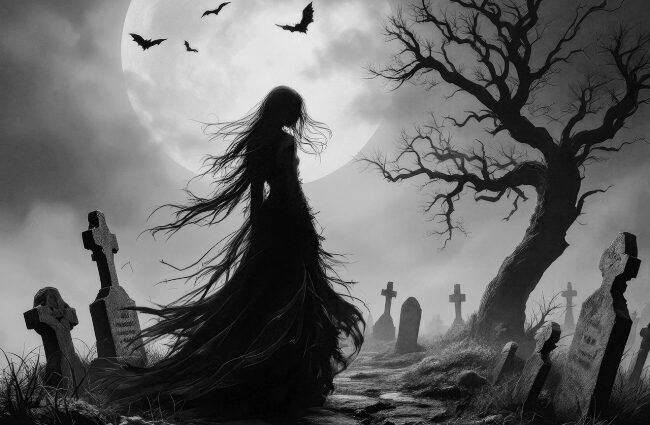Appalachia Bare is pleased to present Evelyn Creekmore’s Honorable Mention entry for our Folklore Short Story Contest entitled “The Other Pitty Pat.”
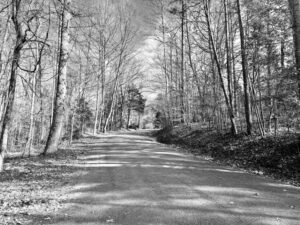
Evelyn Creekmore spent 21 summers at her family cabin in Elkmont, Tennessee, in the Great Smoky Mountains National Park. A content strategist and copywriter by day, she is currently working with her cousins, Katy Dickinson and Peter Somers Dickinson, to reimagine the memoir of their mother (and the author’s aunt) Eleanor Creekmore Dickinson, The Art of Saving Elkmont. It’s under submission and was a finalist for the 2023 Great Smoky Mountains Association Steve Kemp Writer’s Residency. Evelyn holds an MA in writing and rhetoric from the University of North Carolina at Charlotte.
The Other Pitty Pat
The giggles and squeals of approaching children rouse me, but I haven’t the foggiest of notions where I am. I lay on something hard and cold. Above me, a vast black sky. Not a trace of moonlight. Not a star.
The air is fresh and damp, woody and green. But I see no wood. I see no green.
The whole of my body pains me. My head most of all.
The children grow louder, nearer, and I struggle to rise. What on earth has happened? I call out for assistance, but it’s as if they don’t hear me. I call louder, as they chatter closer, coming into my view waving strange lanterns unlike any I’ve seen. No flame, no russet glow, just slender beams of blinding white electric light, like search lights on a ship, but tiny, sweeping in all directions like swords.
“Children, can you hear me?” I narrow my eyes to follow the beams. A flash of stones, slabs. A shimmer of wildflowers. Carved words, carved names. Dear God, I’m in the cemetery.
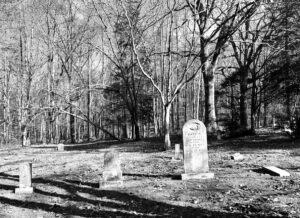
My fiancé Davis had taken such pleasure in pointing out the cemetery to me this morning, as he did every frightening possibility in this wild backcountry. Bobcats and bears. Flash floods and quicksand. The cemetery was at the bottom of the steep hill we ascended by automobile to reach the Hinterland Hotel at the top, where we were meant to be married this afternoon. Halfway up were a huddle of rough hunting cabins, among them Davis’s and his friends’ from town, hung with bleeding turkey and deer carcasses.
As the children come within feet of me, they look ghastly, lights pointed under their chins, faces grotesque. Boys and girls both, barely clothed in short pants. What little cloth covers their chests bears strange symbols. A tiny alligator. “Adidas,” and “Esprit” writ large. I begin to wonder or imagine whether they are children at all. How my head pounds.
These children are far taller and larger than the children I know. Some look quite as adult as I, and I am nearing 25, late for marriage. Davis proposed just in time to save me from certain spinsterhood, overjoying my parents, dismaying me. I think better of calling out again, slipping behind an obelisk, scraping my wrist, swallowing a cry. I must get back to the Hinterland.
The supposed children finally settle in a circle on the other side of the obelisk and dim their lights. They tell each other absurd tales of haints and goblins, interspersed with words I don’t understand. Grody. Gnarly. Mega. Bitchin. Barf. Their talk is tedious. Stiff and impatient, I shuffle my feet and stretch my arms as high and wide as I dare.
“Pitty Pat,” a boy’s voice says, quite ominously, “Pitty Pat is here.”
Silence falls heavy as a log. Do they know me? Had they seen me? Pitty Pat is a pet name given me by Davis, ten years my senior and considered too long a bachelor. And a pet I am to be. So fortunate, as old and plain as I am, to at last be betrothed. No matter Davis’s incessant teasing, his obsession with hunting that will leave all domestic matters in town to me, or his disfigurement in the war.
I dare a peek around the obelisk at the children.
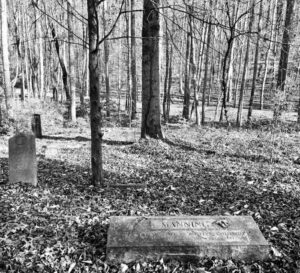
“Pitty Pat,” the boy says again to a smaller girl beside him, her eyes wet, wide and unblinking, “She’s, she’s, right…behind you…”
The girl jumps up as if snake-bit, screaming fit to wake every last person buried beneath us. “She is, she is! She tapped my shoulder!”
I did no such thing, and soon the truth is revealed to be merely a long stick and dramatic timing. The girl’s terror secured; it is apparently time to depart.
Still uncertain whether I can be seen, I follow them up the hill, staying as far back as I’m able and still see their lights. I am eager to part with my peculiar company. How my feet ache. How my heart strains. I do not know what awaits me at the Hinterland, but I am unsafe where I am, unsafe, unsound, and terribly uncertain.
Near halfway in my ascent, the children’s lights give way to a splash of electric stars, porch lights on the hunting cabins. They were not there before. Had the Hinterland run them in today, special for the wedding? And, thank heavens, the turkey and deer carcasses are gone.
Otherwise, the cabins look curiously worse for wear, as if they’d aged decades suddenly and not well. But the porches are peopled, with presumably the children’s parents, who are as scantily clad as their progeny. I stay deep in the shadows, puzzling each cabin quickly as I pass for anything familiar, anyone who might help me.
At one cabin, four women sit on the porch in hardback chairs at a square table, playing a game of cards and smoking cigarettes right in the open—with no holders, no less. I can smell the stench from here. But I know of cigarettes, and I know of playing cards. It’s a comfort.

I hear music from a few cabins down, soft and old, sweet and doleful, like the music with which they’d welcomed us at the Hinterland. Reaching the cabin, I pause—for a moment only. A moment to listen and rest on the large stone covered in soft moss in the small yard. Two men sit still in a porch swing, one old with a dulcimer, one young with a banjo, both in flannels and overalls. I move my head up and down, side to side, not at all in time with the music. How my neck hurts. How numb my hands.
I peel off my wet, soiled day gloves and rub my hands together fast, as if willing a stick to spark flame. Only one more cabin remains before the road downhill becomes dark again. How many feet, how many steps to the Hinterland? And why has no one come for me?
My indecision seems firmly decided as I linger on the mossy rock. If only I had been bold enough to wrest a searchlight from a child or matches from the smoking women.
“Miss Patricia, have no fear . . .”
My name again! High and strong in the mountaineers’ song. I rise by inches and take a few light steps toward them.
“Miss Patricia, you’re welcome here . . .”
Can they see me? Could I show myself? I shut my eyes tight, suck in all the breath my stabbing ribs will permit and dash toward the porch.
When I open my eyes, I see it at once. A kerosene lantern, set on the porch railing, not there before. I have a sudden certainty that the mountain singers, seeming to mark my presence not a whit, had set it out for me.
By the time I return to the Hinterland, utterly depleted, nerves shattered, I very nearly collapse on the first high stone step to the entrance. I cannot breach the next forty. Falling into a doze on the step, I recall mounting them the first time, the difficulty of it, how many times my heel caught, how many times Davis’s hand just missed steadying my elbow. The summit most arduously reached, something happened. What happened?
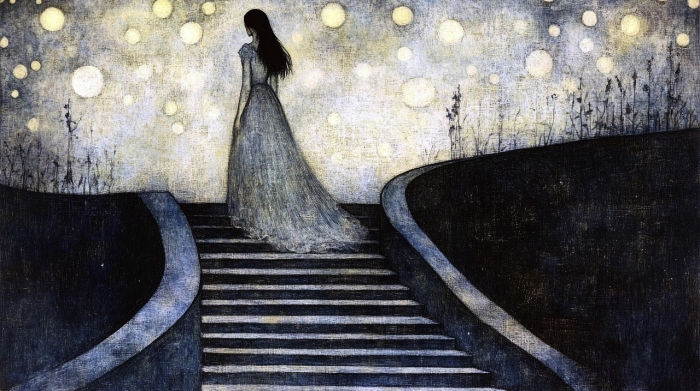
Sometime later in the night, a few minutes or hours, I awake with an abrupt realization. I fell down these stairs. I fell down these stairs, and I most likely died. I fell down them because Davis said there was a hornet after me. I felt a tap on my shoulder, turned, and lost my hard-won foothold. Davis. Ridiculous Davis with a stick, just like the boy in the cemetery. Epiphany delivered at last, I bolt up the stairs, fueled by rage stronger than pain.
I care not who may see me as I veritably storm the Hinterland. Answers. Answers, I will have.
I bound across the hard-scrabble lawn past the high-bubbling stone fountain, take the length of the wraparound porch in two leaps and land skittering into the lobby like a fearless young doe. I am determined to upend every table and rocking chair, dump every drawer, accost every witness.
None of this is necessary.
The answers I seek are laid out clearly and quite artfully before me on the lobby’s large wooden bulletin board. My wedding announcement, obituary, and a photograph of Davis in permanent residence at his hunting cabin. From the date on the photograph, a residence taken up immediately upon my demise.
I found myself in the cemetery because I was buried there, and life has gone on for some time. From the bulletin board, picnickers smile back at me in the 1930s, 40s and 50s. Hikers wave in the 60s and 70s. The cemetery children, emblazoned in alligators, “Adidas” and “Esprit,” tell the last secret. I have arisen in 1982. I have arisen and I am free.
*Image beside newspaper by Dawn Rose from Pixabay, altered b&w
**Featured image credit: FriedeDia, Pixabay, altered b&w
